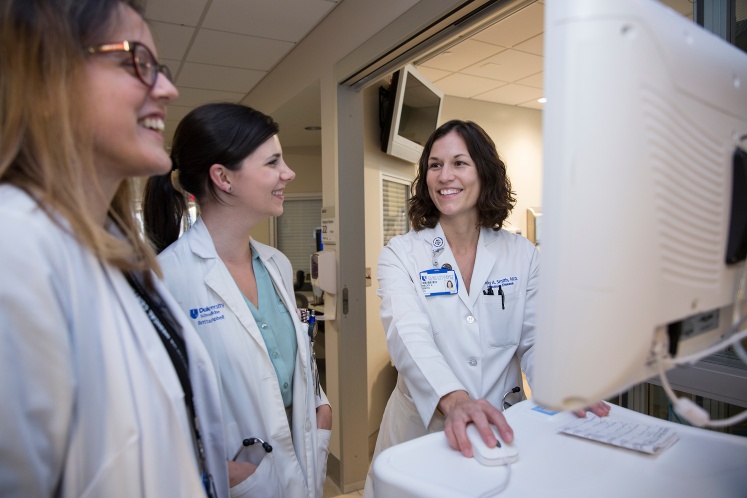
During their training, ID fellows participate in a formal didactic experience, a wide variety of clinical rotations and supervised learning experiences, mentored research and self-directed learning exercises to prepare them to be future leaders in Infectious Diseases.
Consult Services
The clinical training year provides outstanding opportunities to study a wide variety of infectious disease on both an inpatient and ambulatory basis, through literature review and in the microbiology laboratory. Fellows lead the consult team and teach students and residents at the bedside. Trainees will benefit and learn from the experience and teaching of the attending physicians, each with varied backgrounds and interests in diverse areas of infectious diseases.
Fellows will rotate on the following services during their clinical training:
Duke General ID Service (6 months)
One ID fellow and one attending are assigned to each of two General ID consult services (Duke 1 and Duke 2). When available, residents and students will be assigned to these teams as well. Consults may be requested from any inpatient service (including, at times, the Emergency Department) for a wide variety of acute and chronic infectious disease conditions.
Duke Transplant ID Service (3 months)
One ID fellow and one attending are assigned to one of three Transplant ID services. Patients followed on this service include: solid organ transplant (SOT) patients (including those with failed graft if maintained on IS therapy); hematopoietic stem cell transplant (HSCT) / bone marrow transplant patients (autologous and allogeneic); patients with hematologic malignancy (leukemia, lymphoma, MDS, myeloma) (including those with HIV); pre-transplant patients who are listed for SOT or undergoing evaluation for HSCT; patients with durable mechanical circulatory support devices (LVADs).
Durham VA ID Service (3 months)
One ID fellow and one attending are assigned to the VA ID consult service. When available, residents and students will be assigned to these teams as well. Consults may be requested from any inpatient service (including, at times, the Emergency Department) for a wide variety of acute and chronic infectious disease conditions.
Outpatient Clinic
During the clinical year, fellows will have one 1/2-day of clinic per week for outpatient follow-up of patients seen on the inpatient consultation service. The clinic provides follow-up care for patients receiving home IV antibiotics. A formalized outpatient parenteral antibiotic therapy (OPAT) program, managed by a clinic-based provider, ensures safe transition of care across care settings for patients receiving IV antibiotics.
Fellows in their second and third years of training will have one 1/2-day of continuity clinic per week where they will follow a panel of patients with HIV and general infectious disease conditions.
Didactic Curriculum
During the first month of the clinical year, fellows receive an intensive orientation to Infectious Disease consultation. Weekly educational conferences covering topics in general infectious diseases as well as sub-specialties augment the experiential learning fellows receive during their clinical training.
Mentored Research Training and Career Development
During the second and third years of training, fellows will participate in dedicated time for mentored-research projects. Clinical fellows explore research opportunities and pathways and initiate plans for research years during their first year, including selection of specific mentors and projects, as well as a research advisory committee to support their individualized career development. In addition to support from their primary research mentor and research advisory committee, complementary support for career development is offered through the Department of Medicine Fellowship Research Academy and Career Preparation Retreat Series.